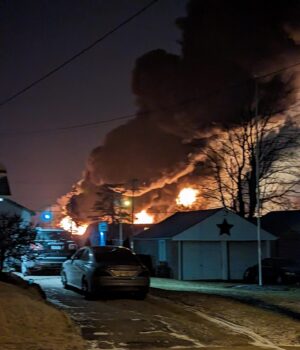by Mikaela Gantz
It has now been three weeks since a train derailed and released toxic chemicals into the environment in East Palestine, Ohio. The cargo train had 150 cars and out of the 38 railcars that derailed, eleven of them contained hazardous materials. Many worry that these materials were released into the air after the combustion or seeped into the ground and could potentially contaminate groundwater. The Environmental Protection Agency (EPA) stated that there were no signs of water quality concerns in the municipal water samples. They also said air quality tests have shown no significant levels of contaminants, those above the limits of residential air quality standards. Some are wary of these statements by the EPA, however, and criticize the slow and inadequate response from the Biden Administration.
The spill took a devastating toll on local ecosystems. Around 3,500 fish from twelve different species died from the spill runoff. Residents are also becoming increasingly concerned about their own health. Many are reporting rashes, headaches, nausea, and dizziness. A federal team opened a health clinic for East Palestine residents to combat these growing concerns.
The Ohio EPA and state officials have tried many different things to deal with the issue of contaminated water. Ohio EPA and state officials have done several different things to try to contain pollution from the chemical spill, such as putting oil containment booms in waterways and aerating contaminated soil and water. The EPA also said it has taken nearly one million gallons of water out of the river to be stored in containers. The EPA has said that because the river is so large the pollutants get diluted very quickly, to the point where they are so miniscule with hope they should soon not affect human or aquatic health. Officials urge local areas to continue drinking bottled water for the time being.
Environmental disasters are rare, but are becoming more frequent. We as a society have a right to know what is going on in the world around us. We have a right to know if there are hazardous materials in our water or our air. Furthermore, we have a hope that the government allows us that right, and more importantly upholds it.




